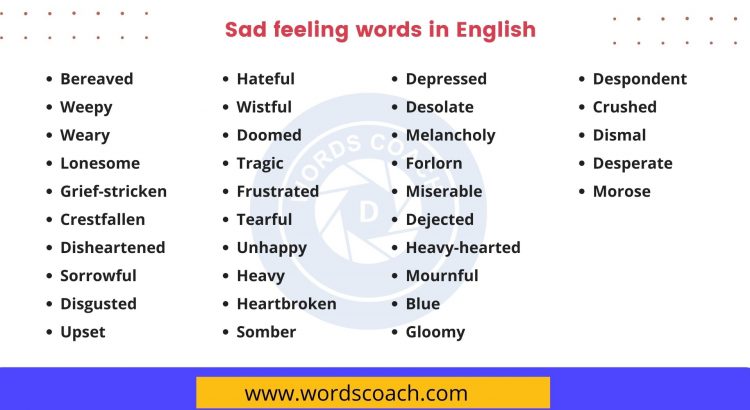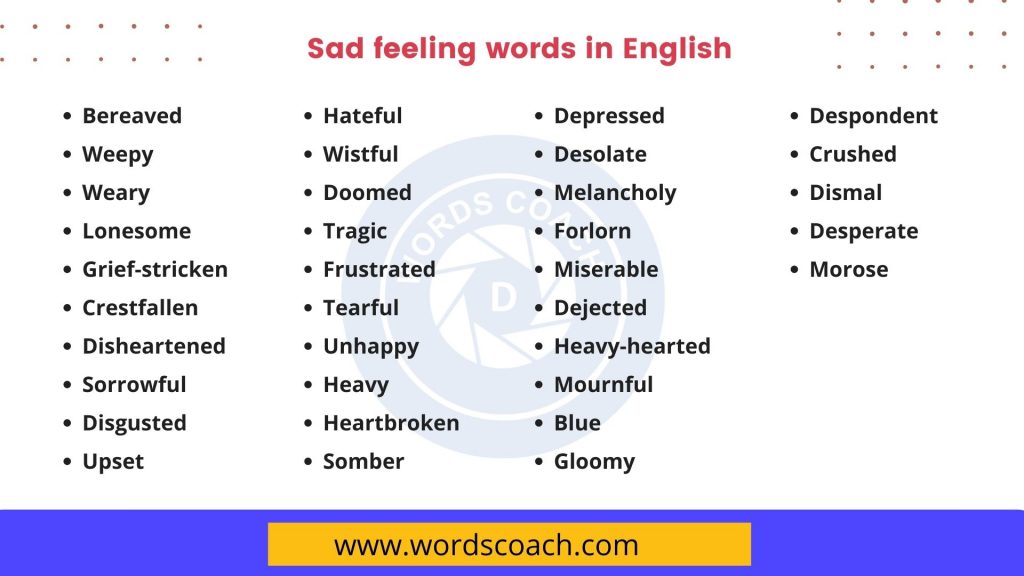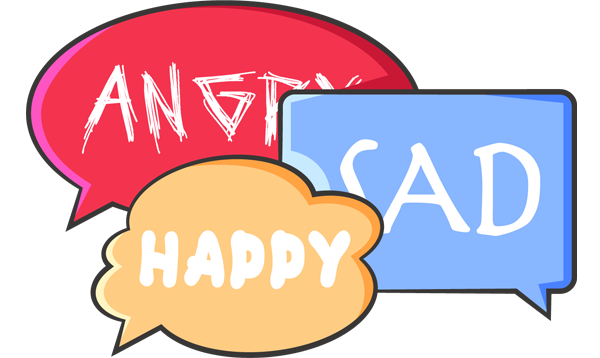В этой статье разберем слова, выражения, идиомы и фразовые глаголы, которые используют носители языка для выражения эмоций: от восторга до глубокой печали.
Когда эмоции переполняют, часто не хватает слов, чтобы описать свое состояние. Если вы пропустили последний автобус, наступили в глубокую лужу и вдобавок потеряли ключи от квартиры, сказать, что вам грустно (I’m sad!) будет просто преступлением! А во время путешествия по Италии, когда каждый день наполнен приключениями и открытиями, хочется использовать более сильные выражения, чем обычное I’m happy! (Я счастлив!).
Радость
I’m happy — первое, что приходит в голову, когда нужно сказать по-английски, что вы счастливы. Давайте рассмотрим, как правильно использовать фразу to be happy, и выучим другие слова и выражения для описания радостных эмоций.
- Чтобы сказать, что вы рады что-то сделать, используйте фразу to be happy to do something или happy to be doing something:
I’m very happy to see you. — Я очень рада тебя видеть!
All the kids were extremely happy to be taking part in the contest. — Все дети были очень рады принять участие в конкурсе. - Когда вы радуетесь из-за того, что случилось что-то хорошее, вы можете использовать фразу to be happy that something has happened:
I’m happy that I have had my car finally repaired. — Я так счастлив, что мою машину наконец отремонтировали.
- Если вы счастливы из-за чего-то, используйте фразу to be happy about something:
I’m so happy about being hired. — Я так счастлива, что меня приняли на работу.
- Если вы очень рады за кого-то, можно использовать фразу to happy for someone:
I can’t explain how happy I am for you. — Не могу передать, как я рада за тебя.
В таблице ниже мы собрали слова и выражения, которые вы можете использовать, чтобы выразить радость на английском.
| Слово | Перевод | Пример |
|---|---|---|
| cheerful | радостный, веселый | I’m in a cheerful mood today. — Сегодня у меня радостное настроение. |
| excited | очень радостный | I’m so excited that we’re going to Portugal! — Я так рада, что мы едем в Португалию! |
| delighted | очень радостный | I was delighted by the result of my test. — Я очень обрадовалась результатам теста. |
| thrilled | в восторге | She was thrilled about having a vacation in Italy. — Она была в восторге из-за предстоящего отпуска в Италии. |
| overjoyed | вне себя от радости | I’m overjoyed that my sister is coming to visit me. — Я вне себя от радости, что моя сестра едет меня навестить. |
| pleased | рад, доволен | Are you pleased about your promotion? — Вы довольны повышением? |
| glad | рад, доволен | I’ll be glad when the conflict is over. — Я буду рад, когда конфликт завершится. |
| to be in a good mood | пребывать в хорошем настроении | It was the day before her vacation, so Anna was in a good mood. — Это был последний день перед отпуском, поэтому Анна была в хорошем настроении. |
| to be thrilled to bits (informal) | быть в восторге | Paul was thrilled to bits when I prepared his favorite pie. — Пол был просто в восторге, когда я приготовила его любимый пирог. |
| to be over the moon (BrE) | на седьмом небе от счастья | I was over the moon when I won the prize. — Я был на седьмом небе от счастья, когда выиграл приз. |
| to be on top of the world | на седьмом небе от счастья | She was on top of the world at that party. — Она чувствовала себя на седьмом небе от счастья на той вечеринке. |
| on cloud nine | на седьмом небе от счастья | Tom was on cloud nine after the birth of his daughter. — Том был на седьмом небе от счастья после рождения дочери. |
| in seventh heaven | на седьмом небе от счастья | Parents got Dave a puppy for Christmas, and he was in seventh heaven. — Родители подарили Дэйву щенка на Рождество, и он был на седьмом небе от счастья. |
| to be walking/floating on air | быть очень счастливым | When I finally passed my driving test, I was walking on air for days. — Когда я наконец сдал тест по вождению, я был очень счастлив еще несколько дней. |
| to be walking/floating on a cloud | быть очень счастливым | She wasn’t leaving after all. He was floating on a cloud. — В конце концов, она решила не уезжать. Он был очень счастлив. |
| to have a whale of a time (informal) | весело провести время | We had a whale of a time on our honeymoon. — Мы отлично провели время в нашем свадебном путешествии. |
Грусть
Когда день не задался или случилось что-то плохое, мы можем использовать прилагательное sad (грустный), чтобы описать свое настроение, но лучше употреблять синонимы, которые разнообразят вашу речь и более точно опишут эмоции.
| Слово | Перевод | Пример |
|---|---|---|
| unhappy | несчастный | I was deeply unhappy at school. — Я был глубоко несчастен в школе. |
| dejected | грустный, разочарованный | Sam sounded dejected when he told me that he hadn’t got the job. — Голос Сэма звучал разочарованно, когда он сказал мне, что не получил работу. |
| downcast | грустный, разочарованный | You looked a little downcast this morning. — Утром ты выглядела немного грустной. |
| down | несчастный, разочарованный | Whenever I’m feeling down, I buy myself a cake. — Когда я чувствую себя несчастной, я покупаю себе пирожное. |
| miserable | глубоко несчастный | I felt miserable and blamed myself for what I had said to my sister. — Я чувствовал себя несчастным и винил себя за то, что сказал сестре. |
| depressed | подавленный, угнетенный | After his wife broke up with him, he became depressed. — После того как его бросила жена, он стал очень подавленным. |
| heartbroken | убитый горем | Anna was heartbroken when her dog got lost. — Анна была убита горем, когда ее собака потерялась |
| distressed | убитый горем | My family was distressed over the loss of our house in the storm. — Моя семья была убита горем из-за потери дома во время шторма. |
| devastated | опустошенный, подавленный | The whole city was devastated by this awful tragedy. — Весь город был подавлен этой ужасной трагедией. |
| to get (smb) down | привести (кого-то) в уныние, испортить (кому-то) настроение | The bad weather gets me down. ― Плохая погода приводит меня в уныние. |
Гнев и злость
Даже такие негативные эмоции, как раздражение и злость нужно уметь описывать на английском. Еще на начальных уровнях вы выучили выражения I’m angry (я зол) и I feel angry (я зол), а сегодня мы немного расширим ваш словарный запас новой лексикой:
- Чтобы сказать, что вы сердитесь на кого-то, используйте фразу to be angry at/with:
I was so angry at him as he hadn’t told me his plans. — Я так рассердилась на него из-за того, что он не рассказал мне о своих планах.
- Если вы рассержены из-за чего-то, используйте предлог about:
I don’t understand what Tom’s angry about. — Я не понимаю, из-за чего Том так рассержен.
| Слово | Перевод | Пример |
|---|---|---|
| annoyed | раздраженный, раздосадованный | She was annoyed that no one had told her the class was called off. — Она была раздражена из-за того, что никто ей не сказал, что урок отменили. |
| irritated | раздраженный | Adam was irritated with himself for his stupid behavior at the party. — Адам был раздражен из-за своего глупого поведения на вечеринке. |
| furious | яростный | Don’t tell Mom I broke her favorite cup — she’ll be furious. — Не говори маме, что я разбила ее любимую кружку, она будет в ярости. |
| outraged | возмущенный | I was outraged by his rude and very unpleasant statement. — Я была возмущена его грубым и очень неприятным высказыванием. |
| mad (informal) | рассерженный | Mike was mad at his wife for damaging their car. — Майк был рассержен на жену из-за того, что она повредила машину. |
| to get cross with somebody (BrE, informal) | раздраженный из-за кого-то, сердитый на кого-то | My Mom gets cross with me if I leave the kitchen in a mess. — Моя мама очень сердится на меня, если я оставляю на кухне беспорядок. |
| to be in a bad/foul mood | быть в плохом/раздраженном настроении | He seems to be in a bad mood about something. — Кажется, он в плохом настроении из-за чего-то. |
| to blow up | взорваться от гнева | She might blow up at any second. — Она может взорваться в любую секунду. |
| hit the roof/ceiling | сильно рассердиться | Mom will hit the roof when she finds out I failed all the exams. — Мама очень рассердится, когда узнает, что я провалил все экзамены. |
| hot under the collar (informal) | быть очень сердитым | My wife was really hot under the collar when I told her that I had lost the job again. — Моя жена была вне себя от ярости, когда я сказал ей, что опять потерял работу. |
| to fly into a rage | впадать в ярость | Our teacher flew into a rage when she realized no-one had been listening to her. — Наша учительница просто впала в ярость, когда поняла, что ее никто не слушал. |
Страх
Как и любая другая эмоция, страх может отражать множество оттенков: от легкого испуга до настоящего ужаса. Для начала разберем самые распространенные прилагательные со значением «испуганный» — afraid, frightened и scared:
- Чтобы сказать, что вы боитесь кого-то или чего-то, используйте фразу to be afraid/frightened/scared of:
A lot of people are afraid of spiders. — Много людей боятся пауков.
She was frightened of her boss. — Она боялась своего начальника. - Если вы боитесь сделать что-то, свои чувства можно выразить с помощью фразы to be afraid/frightened/scared to do something:
I was afraid to show anyone my scars. — Я боялась показать кому-то свои шрамы.
The child was too scared to talk. — Ребенок был слишком напуган, чтобы говорить.
Между словами frightened, scared и afraid есть небольшая разница в употреблении. Scared звучит менее формально, чем frightened, поэтому именного его вы с большей вероятностью услышите в речи носителей языка, а вот afraid — наиболее формальный вариант из всех синонимов.
| Слово | Перевод | Пример |
|---|---|---|
| alarmed | встревоженный | She was alarmed as she had to perform in front of an audience. — Она была встревожена, поскольку она должна была выступить перед аудиторией. |
| fearful (formal) | напуганный | Emma was fearful that she might fail the exam. — Эмма боялась, что может провалить экзамен. |
| terrified | очень напуган | Some passengers looked terrified as the plane took off. — Некоторые пассажиры выглядели очень испуганными, когда самолет взлетел. |
| petrified | оцепеневший от страха | Bank employees were petrified with fear when they saw a robber with a gun. — Работники банка оцепенели от страха, когда увидели грабителя с оружием. |
| to be scared stiff/scared to death (informal) | быть напуганным до смерти | I had to make a speech, and I was scared to death. — Я должен был произнести речь, поэтому был напуган до смерти. |
| to freeze up | замереть от страха | I didn’t know what to do. I just froze up. — Я не знала, что делать. Я просто замерла от страха. |
Растерянность
Если вы никак не можете ни на чем сосредоточиться, все валится из рук, и вам надо рассказать об этом на английском — воспользуйтесь фразами и выражениями из таблицы.
| Слово | Перевод | Пример |
|---|---|---|
| confused | растерянный | She was rather confused by his words. — Она была довольна растеряна после его слов. |
| puzzled | озадаченный | Ross looked puzzled when everyone started laughing. — Росс выглядел озадаченным, когда все начали смеяться. |
| baffled | озадаченный, сбитый с толку | Her rude question about my weight baffled me completely. — Ее грубый вопрос о моем весе полностью сбил меня с толку. |
| bewildered | озадаченный, сбитый с толку | I’m still rather bewildered by her unexpected resignation from her position. — Я до сих пор немного сбит с толку ее неожиданным уходом с должности. |
| dazed | растерянный, не способный четко мыслить | You’re looking a bit dazed — has something happened? — Ты выглядишь немного растерянной. Что-то случилось? |
| bemused | поставленный в тупик | I was slightly bemused after she left without any explanation. — Меня немного поставило в тупик то, что она ушла без объяснений. |
| can’t think straight (informal) | неспособный нормально мыслить | I just can’t think straight now because of all the events. — Я просто не в состоянии сейчас думать из-за всех этих событий. |
| to be at a loss | растерянный, в замешательстве | He was at a loss which tie to choose. — Он был в замешательстве, какой галстук выбрать. |
Волнение
Кроме worried (обеспокоенный) есть еще много прилагательных, которые помогут вам описать чувство волнения и тревоги на английском.
| Слово | Перевод | Пример |
|---|---|---|
| worried | обеспокоенный | I was so worried that I couldn’t think straight. — Я так беспокоилась, что не могла нормально мыслить. |
| anxious | тревожащийся | My granny always gets anxious if we don’t arrive on time. — Моя бабушка всегда тревожится, если мы не приезжаем вовремя. |
| nervous | нервничающий | I always feel nervous before an exam. — Я всегда нервничаю перед экзаменом. |
| uneasy | беспокойный, напряженный, чувствующий дискомфорт | When Mary wasn’t home by midnight, I began to feel uneasy. — Когда Мэри не было дома к полуночи, мне стало неспокойно. |
| concerned (formal) | озабоченный, обеспокоенный | He was really concerned to hear that his wife had had an accident. — Он был очень обеспокоен, узнав, что его жена попала в аварию. |
| bothered | взволнованный, обеспокоенный | Jerry is very bothered about what his father thinks of him. — Джерри очень волнует то, что о нем думает отец. |
| stressed (out) (informal) | вымотанный, напряженный | He has been working for ten hours today and is really stressed out. — Сегодня он проработал десять часов и очень сильно вымотался. |
| troubled | озабоченный | Are you okay? You look a bit troubled. — У тебя все в порядке? Ты выглядишь немного озабоченным. |
Обратите внимание, что слово anxious обычно используется, когда говорят об общем чувстве беспокойства и тревожности без видимой причины. Однако оно более формальное, чем worried.
Удивление
Как быть, если случилось что-то удивительное и вам надо сказать об этом на английском, но слово surprised (удивленный) и близко не может передать ваши эмоции? Интересные варианты вы найдете в следующей таблице.
| Слово | Перевод | Пример |
|---|---|---|
| surprised | удивленный | Nobody was surprised when they married. — Никто не удивился, когда они поженились. |
| amazed | изумленный, крайне удивленный | You’ll be amazed when you see my wedding dress. — Ты будешь очень удивлена, когда увидишь мое свадебное платье. |
| astonished | ошарашенный | I was astonished by the result of the test. — Я был ошарашен результатом теста. |
| stunned | потрясенный | I was too stunned to say something back. — Я был слишком потрясен, чтобы сказать что-то в ответ. |
| speechless | потерявший дар речи от удивления | His words left me speechless. — Его слова заставили меня потерять дар речи. |
| to be taken aback | быть удивленным и не знать, как реагировать на ситуацию | I was a little taken aback by her rude question. — Меня немного смутил ее грубый вопрос. |
| gobsmacked (informal) | ошеломленный | I was absolutely gobsmacked when I saw my exam results. — Я был ошеломлен, когда увидел свои результаты экзамена. |
Смотрите, сколько замен можно найти привычным словам! Старайтесь использовать новую лексику — вы будете звучать более красиво и естественно. Учиться описывать свои эмоции на английском можно на групповых уроках с преподавателем в клубе Skills. Занятия проходят ежедневно с утра до вечера.
Список выражений по теме «От печали до радости: как выразить эмоции на английском» (*.pdf, 132 Кб)
© 2023 englex.ru, копирование материалов возможно только при указании прямой активной ссылки на первоисточник.

As humans, we experience a range of emotions, from happiness and joy to anger and sadness. Expressing these emotions in words can help us understand and process our feelings, communicate with others, and form deeper connections. In English, there are numerous feeling words that we can use to describe how we feel. In this blog, we will explore some of the most common feeling words in English.
- Happy – Feeling joyful or content Happiness is a positive emotion that we all strive for. We feel happy when something good happens to us or when we are surrounded by people we love. Some synonyms of happy include pleased, delighted, and overjoyed.
- Sad – Feeling unhappy or distressed Sadness is a natural emotion that we all experience at some point. We may feel sad when we lose someone or something important to us or when things don’t go as planned. Some synonyms of sad include unhappy, sorrowful, and heartbroken.
- Angry – Feeling annoyed or frustrated Anger is a powerful emotion that can be difficult to control. We feel angry when we are provoked or when we perceive a threat. Some synonyms of angry include annoyed, frustrated, and furious.
- Afraid – Feeling scared or anxious Fear is a basic human emotion that helps us stay safe in dangerous situations. We feel afraid when we perceive a threat or when we are in an unfamiliar or uncomfortable situation. Some synonyms of afraid include scared, anxious, and nervous.
- Excited – Feeling enthusiastic or eager Excitement is a positive emotion that we feel when we anticipate something good happening. We may feel excited when we receive good news or when we are about to embark on a new adventure. Some synonyms of excited include enthusiastic, eager, and thrilled.
- Bored – Feeling uninterested or disengaged Boredom is a negative emotion that we feel when we are not engaged in activities that interest us. We may feel bored when we have nothing to do or when we are stuck in a monotonous routine. Some synonyms of bored include uninterested, disengaged, and uninspired.
- Love – Feeling affection or attachment Love is a complex emotion that we feel towards people, animals, or things that are important to us. We may feel love towards our family, friends, or significant others. Some synonyms of love include affection, attachment, and devotion.
- Envious – Feeling jealous or resentful Envy is a negative emotion that we feel when we want something that someone else has. We may feel envious of someone’s success or possessions. Some synonyms of envy include jealousy, resentment, and covetousness.
- Guilty – Feeling remorseful or ashamed Guilt is a negative emotion that we feel when we believe we have done something wrong. We may feel guilty when we have hurt someone or when we have not lived up to our own expectations. Some synonyms of guilt include remorse, shame, and regret.
- Grateful – Feeling thankful or appreciative Gratitude is a positive emotion that we feel when we appreciate the things we have in life. We may feel grateful for our health, our family, or our opportunities. Some synonyms of grateful include thankful, appreciative, and indebted.
List of Feeling words in English
Sad feeling words in English:
| Bereaved | Weepy |
| Weary | Lonesome |
| Grief-stricken | Crestfallen |
| Disheartened | Sorrowful |
| Disgusted | Upset |
| Hateful | Wistful |
| Doomed | Tragic |
| Frustrated | Tearful |
| Unhappy | Heavy |
| Heartbroken | Somber |
| Depressed | Desolate |
| Melancholy | Forlorn |
| Miserable | Dejected |
| Heavy-hearted | Mournful |
| Blue | Gloomy |
| Despondent | Crushed |
| Dismal | Desperate |
| Morose |

Confusion feeling words in English:
| Bewildered | Disconcerted |
| Lost | Perplexed |
| Flustered | Upset |
| Confounded | Disoriented |
| Pessimistic | Shy |
| Unsettled | Uncertain |
| Hesitant | Mystified |
| Stumped | Dumbfounded |
| Discombobulated | Ambivalent |
| Muddled | Frustrated |
| Confused | Nonplussed |
| Unsure | Perplexed |
| Indecisive | Skeptical |
| Puzzled | Embarrassed |
| Doubtful | Tense |
| Baffled |
Energized feeling words in English:
| Dynamic | Empowered |
| Invigorated | Vivacious |
| Enthusiastic | Roused |
| Thrilled | Enlivened |
| Stirred | Renewed |
| Electrified | Fired up |
| Refreshed | Exhilarated |
| Lively | Activated |
| Healthy | Inspired |
| Excited | Animated |
| Stimulated | Eager |
| Motivated | Pumped |
| Creative | Vibrant |
| Determined | Strengthened |
| Sparkling | Passionate |
| Zealous | Focused |
| Energized |
Strong feeling words in English:
| Gritty | Fearless |
| Certain | Forceful |
| Unique | Determined |
| Unshakable | Ambitious |
| Sure | Tenacious |
| Robust | Indomitable |
| Powerful | Hardy |
| Steadfast | Empowered |
| Invincible | Potent |
| Bold | Intrepid |
| Assertive | Unyielding |
| Stalwart | Herculean |
| Unwavering | Resilient |
| Dynamic | Confident |
| Unbreakable | Vigorous |
| Dominant | Secure |
| Persistent |
Panic feeling words in English:
| Startled | Shocked |
| Frenzied | Stunned |
| troubled | hurt |
| desperate | Confused |
| anxious | stuck |
| Alarmed | Overwhelmed |
| Paralyzed | Desperate |
| Tense | Perturbed |
| unsure | Uncomfortable |
| Petrified | lost |
| Agitated | Uneasy |
| Frantic | Distressed |
| Shaken | Panicky |
| Apprehensive | Terrified |
| Nervous | Hysterical |
| Frightened | Afraid |
| Worried | frozen |
| mixed up | Anxious |
| Insecure |
Anger feeling words in English:
| Hostile | Fuming |
| Aggravated | Critical |
| Indignant | Outraged |
| Fed up | Steaming |
| Enraged | Disgruntled |
| Bitter | Annoyed |
| Mad | Livid |
| Displeased | Agitated |
| Offended | Seething |
| Incensed | Riled up |
| Vexed | Raging |
| Provoked | Wrathful |
| Disgusted | Furious |
| Irritated | Infuriated |
| Resentful |
Happy feeling words in English:
| Optimistic | Enthusiastic |
| Joyful | Gleeful |
| Loving | Amused |
| Elated | Euphoric |
| Ecstatic | Satisfied |
| Pleased | Radiant |
| Merry | Excited |
| Enchanted | Glad |
| Jubilant | Hopeful |
| Content | Fulfilled |
| Marvelous | Grateful |
| Cheerful | Blissful |
| Overjoyed | Thrilled |
| Upbeat | Delighted |
| Charmed |
Download Vocabulary Builder App
In conclusion, feeling words in English can help us express and understand our emotions better. By using feeling words, we can communicate our feelings to others and form deeper connections. It’s important to recognize and acknowledge our emotions, no matter how positive or negative they may be, as they are an essential part of being human.
Post Views: 575
Содержание статьи:
- Колесо эмоций от Lindsay Braman
- Базовая лексика: эмоции по-английски
- Про эмоции не английском — средний уровень
- Продвинутая лексика на тему эмоций
- Состояние или эмоция на английском
- Упражнение для закрепления
Сегодня мы дадим вам лексику на тему эмоций. На момент публикации это самая исчерпывающая подборка в интернете. Мы проверили. Даже если у вас высокий уровень, вы наверняка найдете здесь для себя новые слова.
Колесо эмоций от Lindsay Braman
Терапевт и психолог-педагог из США по имени Lindsay Braman составила колесо Emotion Sensation Feeling Wheel, которое должно помочь людям идентифицировать свои эмоции. Часто человеку сложно выразить свои эмоции словами из-за банального неумения разобраться в собственных чувствах. Когда предлагается выбрать из списка слов, становится намного проще.
Изначально это колесо никак не относилось к изучению английского, но мы его возьмем в качестве учебного материала.
Ближе к центру на колесе расположены базовые эмоции:
- Fear – страх
- Anger – злость
- Disgust – отвращение
- Sad – грусть
- Happy – счастье
- Surprise – удивление
Далее, чем дальше от центра, тем более тонкие оттенки эмоций и чувств. Все эти слова, и даже больше, вы найдете в этой подборке. Для удобства мы их разбили по уровням сложности.
Подсказка: Если вы хотите найти слово из колеса в статье, воспользуйтесь поиском по странице. На десктопе это можно сделать, нажав Ctrl + F.
Еще подсказка: Если вы зарегистрированы на сайте, любое слово можно выделить и сохранить себе на изучение в персональный словарь, чтобы позже попрактиковать их в бесплатных онлайн-тренажерах EnglishDom.
Читай также
Как заговорить на английском (видео)
Базовая лексика: эмоции по-английски
- Angry – злой | Anger – злость
- Annoyed – раздраженный
- Bored – скучающий
- Boring – скучный
- Calm – спокойный
- Careful – заботливый | Care – забота
- Confused – недоумевающий
- Confident – уверенный
- Dangerous – опасный
- Depressed – подавленный | Depression – депрессия
- Disappointed – расстроенный
- Distant – отстраненный
- Dreamy – мечтательный | Daydreaming – мечтательность
- Empty – опустошенный
- Energetic – энергичный | Energy – энергия
- Excited – взволнованный | Excity – возбуждение
- Glad – рад
- Hateful – ненавистный | Hate – ненависть
- Happy – счастливый | Happiness – счастье
- Hungry – голодный | Hunger – голод
- Hurt – раненый
- Hostile – враждебный
- Hopeful – полный надежд | Hope – надежда
- Ignored – игнорируемый
- Interested – заинтересованный
- Isolated – изолированный
- Joyful – радостный | Joy – радость
- Lovely – прекрасный
- Loving – любящий
- Lucky – везучий | Luck – везение
- Mad – безумный | Madness – безумие
- Normal – обычный
- Open – открытый
- Optimistic – оптимистично-настроенный | Optimism – оптимизм
- Peaceful – умиротворенный
- Pessimistic – пессимистично-настроенный | Pessimism – пессимизм
- Pleased – довольный
- Powerful – сильный | Power – сила
- Powerless – лишенный сил
- Proud – гордый
- Sad – грустный | Sadness – грусть
- Scared – испуганный
- Shocked – шокированный | Shock – шок
- Shy – стеснительный | Shyness – застенчивость
- Sleepy – сонный
- Sorry – огорченный
- Sorrowful – опечаленный | Sorrow – печаль
- Surprised – удивленный | Surprise – удивление
- Tired – уставший | Tiredness – усталость
- Thoughtful – задумавшийся | Thoughts – мысли
- Unhappy – несчастливый
- Unpleasant – неприятный
- Upset – расстроенный
- Victimized – ставший жертвой | Victim – жертва
- Vulnerable – уязвимый
- Worried – тревожный | Worry – беспокойство
Сохранить набор Emotions I
Про эмоции не английском — средний уровень
- Abandoned – брошенный
- Accepted – принятый
- Aggressive – агрессивный | Aggression – агрессия
- Ashamed – пристыженный
- Amazed – пораженный
- Amused – обожаемый
- Anxious – тревожный
- Apathetic – апатичный | Apathy – апатия
- Astonished – изумленный
- Cheerful – жизнерадостный | Cheer – радость
- Cheerless – безрадостный
- Composed – невозмутимый | Equanimity невозмутимость
- Contented – довольный
- Critical – критичный
- Delightful – восхищенный | Delight – восторг
- Despair – отчаяние
- Despondent – отчаявшийся
- Devastated – потрясенный
- Devoted – преданный | Devotion – преданность
- Disapproval – неодобрение
- Dismayed – встревоженный
- Disrespected – неуважаемый
- Distressed – расстроенный
- Disturbing – тревожный
- Disillusioned – разочарованный
- Doubtful – сомневающийся | Doubt – сомнение
- Embarrassed – смущенный| Embarrassment – смущение
- Excellent – отличный
- Exhausted – измученный | Exhaustion – истощение
- Fearful – страшный | Fear – страх
- Frighted – напуганный
- Fulfilled – удовлетворенный выполненной задачей
- Guilty – виноватый
- Hateful – ненавистный | Hate – ненависть
- Heartbroken – с разбитым сердцем
- Hurt – обиженный
- Humiliated – униженный
- Hysterical – истерический | Hysteria – истерия
- Important – важный
- Inquisitive – любознательный
- Inspired – вдохновленный | Inspire to learn – вдохновляем выучить
- Intimate – близкий
- Irritated – раздраженный
- Jealous – завистливый | Envy – зависть
- Liberated – освобожденный | Liberty – свобода
- Lonely – одинокий | Loneliness – одиночество
- Lovey-dovey – влюбленный
- Merry – веселый
- Moved – растроганный
- Offended – оскорблённый
- Perplexed – озадаченный
- Provoked – спровоцированный
- Provocative – провоцирующий
- Passionate – страстный | Passion – страсть
- Remorseful – раскаявшийся
- Respected – уважаемый | Respect – уважение
- Ridiculed – осмеянный
- Sarcastic – язвительный | Sarcasm – сарказм
- Satisfied – удовлетворенный
- Scared – испуганный
- Sensitive – чувствительный | Sense – чувство
- Skeptical – скептически настроенный
- Suspicious – подозрительный
- Terrible – ужасный
- Terrified – напуганный
- Thirsty – испытывающий жажду | Thirst – жажда
- Threatened – чувствующий угрозу
- Touching – трогательный
- Violated – подвергнутый насилию
- Withdrawn – ушедший в себя
- Worth – ценный
- Worthless – обесцененный
Сохранить набор Emotions II
Продвинутая лексика на тему эмоций
- Abominable – противный | Disgust – отвращение
- Affectionate – любящий | Love – любовь
- Agitated – взволнованный
- Alienated – отчужденный
- Angst-ridden – охваченный страхом | Fear – страх
- Appalled – испуганный
- Arrogant – высокомерный
- Astir – возбужденный
- Aversion – отвращение
- Avoidance – избегающий
- Awe – трепещущий
- Awed – благоговейный
- Awful – ужасный
- Dejected – удрученный | Dejection – уныние
- Detestable – отвратительный
- Disgusting – отвратительный
- Dispassionate – бесстрастный
- Eager – жаждущий
- Elated – ликующий
- Enraged – разъяренный
- Ecstatic – восторженный
- Faithful – верный | Faith – доверие
- Fuming – яростный
- Furious – взбешенный | Fury – ярость
- Giggly – хихикающий
- Haggard – изможденный | Depletion – изнемождение
- Hesitant – нерешительный
- High-spirited – в хорошем настроении
- Inadequate – неадекватный
- Indifferent – безразличный | Indifference – безразличие
- Inferior – подчиненный
- Infuriated – взбешенный
- Infuriated – разъяренный
- Insane – обезумевший
- Insecure – неуверенный
- Insignificant – ничтожный
- Insulting – оскорбительный
- Irascible – вспыльчивый | Irascibility – вспыльчивость
- Judgmental – осуждающий
- Loathing – ненависть
- Low-spirited – подавленный
- Malevolent – недоброжелательный
- Malignant – зловредный
- Mirthful – радостный
- Nonchalant – безразличный
- Obnoxious – неприятный | Aversion – отвращение
- Odious – гнусный
- Overwhelmed – перегруженный
- Peevish – сварливый
- Rejected – отвергнутый
- Repugnant – отвратительный
- Repulsive – омерзительный | Distaste – неприязнь
- Resentful – обиженный
- Revolted – восставший
- Revulsion – отвращение
- Spiteful – злобный | Malice – злоба
- Startled – пораженный
- Stuffed – объевшийся
- Stunned – ошеломленный | Stun – ошеломление
- Submissive – покорный
- Woozy – одурманенный
Сохранить набор Emotions III
Состояние или эмоция на английском
Вы наверняка обратили внимание, что некоторые эмоции в списках продублированы. Например, sad (грустный) и sadness (грусть). Первое в этом случае является состоянием и прилагательным, а второе — эмоцией и существительным. Как отличить одно от другого в английском языке?
Вот список свойственных для существительных окончаний: – -tion, -ity, -er, -ness, -ism, -ment, -ant, -ship, -age, -ery и другие.
Это не значит, что у всех существительных будет одно из этих окончаний. Окончание может быть другим, а еще его может не быть вовсе. Но наличие такого окончания будет явно указывать на часть речи. Например: devotion (преданность), embarrassment (смущение) и так далее.
А вот типичные окончания прилагательных: -able, -ible, -ic, -ive, -full, -less и другие.
Опять же, не все прилагательные можно так легко вычислить. У слова sad, например, окончания вовсе нет. Зато у многих других есть. Например: abominable (противный), cheerless (безрадостный), repulsive (омерзительный) и другие. Часто у прилагательных можно встретить окончание -ed. Это означает, что они образованы от совершенного0 глагола, и по сути являются причастиями. Например: tired (уставший), amazed (пораженный).
Более подробно обо всем этом читайте здесь:
Окончания в английском языке
Суффиксы и приставки в английском языке
Читай также
Интенсивы по английскому языку. Так ли они полезны
Упражнение для закрепления
Сейчас мы вам предлагаем посмотреть на картинку с изображением людей и описать, какие эмоции они испытывают. Может показаться, что мы от английского резко перешли к психологии, но нет. Мы не будем делать выводы о вашем психологическом состоянии. Это просто тест для закрепления темы.
Опишите эмоции на английском, чтобы попрактиковаться в применении новой лексики в реальной ситуации. Можете сделать это для себя, в голове или вслух, а можете написать в комментариях. Мы просматриваем все комментарии, и вас обязательно похвалим. Дерзайте!
Кстати, у нас в EnglishDom есть специальный тест на определение уровня английского. Вот там уже можно получить более-менее объективную оценку. А еще лучше записаться на бесплатный пробный урок с преподавателем по видеосвязи. Это вообще идеальный вариант.
Читайте также: Описание внешности человека на английском
EnglishDom #вдохновляемвыучить
The normalization of the verb to describe the feeling is called the feeling. It can be used to describe touch sensations or perceptions.
To improve your English vocabulary, learn useful emotion words and pictures with example sentences. You may find yourself needing to express your feelings or describe the emotions of someone else. It is essential to understand English and be able talk about different emotions. These emotion names can also be helpful in situations when someone is trying to explain to you their feelings. By being able recognize what they are saying you will be able better to assist them.
With this article, we will be explaining what feelings are and the difference between feelings and emotions, if that’s not enough, we are also going to share with you various positive and negative feeling words and a detailed list of feelings and emotions in English!
There are more than seven billion people on Earth today, and yet they are all different. If there’s one thing we can all agree on, it’s our feelings. All of us feel, and all experience difficulty at one time or another in our lives. We don’t fully understand how feelings are expressed.
The feeling of empathy has been around for a long time. Thomas Brown was the one who discovered them. This was also the year the word was officially added into the dictionary with the meaning that we still use today. The meaning of feelings was different than before. There are two meanings to the word “feelings”: emotional and physical.
The first word to include the physical aspect of the word “feelings” was added to the dictionary. It’s both a verb and a physical thing. A physical feeling refers to what you physically feel. For example, you might feel warmth while lying under the summer sun, or under a blanket in the winter. A second example is when you are too close to a flame, or break a bone.
We will be focusing our attention on the emotional side of the word “feelings“. A feeling that you feel inside is called an emotional feeling. It could be happy, sad, angry, or disgusting.
It can be easier to describe something physical when it is physically felt. It can be difficult to describe emotional feelings. Because we all feel different and sometimes mistake one feeling for another, it can be difficult to describe them.
Even though it’s been more than two-hundred and fifty years since the discovery of feelings, we still don’t have enough information. We have made great progress in our knowledge expansion, but we are still far from being done. People often mistakenly believe that emotions and feelings are one thing. They may look similar, but they do not necessarily mean the same thing.
Thomas Brown discovered the concept of emotions thirty years ago. Years later during the 1970’s, psychologist Paul Eckman, concluded that humans had six different emotions: happiness, sadness, disgust, fear, surprise and anger. As studies progressed, however, it became clear that this number was much higher than initially believed. Debates about raising the number 6 to a shocking 27-year-old and claiming that the total amount of emotions is even greater than 27, are still ongoing.
We now know what emotions are and how they differ from feelings.
Emotions are the reason we use the term “emotional feelings”. Emotions are a physical reaction to our environment. This means that emotions can be aroused before feelings. It can be difficult to recognize emotions because they are physical. However, feelings are mental associations or reactions to emotions. Because they occur in the mind and not our bodies, it is much harder to identify a feeling.
Imagine that you are afraid of the dark, and that all your lights go out because of a storm. Your body will now represent fear. You’ll feel your eyes wide open and your heart rate slow. However, your inner feelings are more cautious, worried and nervous. These are the emotions associated with that emotion. Emotions are felt on the body, while feelings occur in the mind.
Here are some examples: List of Adjectives This will help you to narrow down the word that best describes your feelings and emotions.



- Happy
- Fear not
- It’s sad
- Hot
- You’re amused
- Bored
- Anxious
- Be confident
- Cold
- Suspicious
- Surprising
- Loving
- Curious
- Envious
- Jealous
- Miserable
- Are you confused?
- It’s stupid
- Anger
- Sick
- Ashamed
- Withdrawn
- Indifferent
- We are sorry
- Decided
- Crazy
- Bashful
- Depressed
- Frightened
- Are you interested?
- Shy
- We are hopeful
- Regrettable
- Scared
- Sturdy
- Thirsty
- Guilt
- Nervous
- You’re embarrassed
- Disgusted
- Proud
- Emotional
- Lonely
- Frustrated
- Hurt
- Hungry
- Tired
- Think about it
- Pained
- Optimistic
- Get Relief
- Puzzled
- Shocked
- Joyful
- tired
- Excited
- Skeptical
- Bad
- Be worried
HAPPINESS
Happiness refers to the relationship of mindset, mental, or emotional states. It includes positive emotions that range from contentment and intense joy. It is the feeling of being well.
ANGER
Anger, also known as rage is an intense emotion that is a strong and uncomfortably emotional response to perceived provocation. Anger can also be a feeling that you feel the need to fight or take immediate action.
CARING
Caring is a personal act that shows compassion or does social work. It is caring for people who are sick or need assistance in managing their lives.
DEPRESSION
Depression can be described as a mood disorder that causes a feeling of sadness or lack of interest.
INADEQUATENESS
Inadequacy is a feeling that is either a state or condition of insufficiency, and is also known as feeling inadequate.
FEAR
Fear can be described as a feeling of fear that is caused by a sensed threat or danger, physiological changes and final expressions like hiding from certain events, freezing, or freezing.
CONFUSION
Confusion refers to a state or feeling of confusion in the mind or thought due to specific issues.
HURT
Hurt can be described as a feeling of pain in any part of the body, or a harsh feeling in the heart.
LONELINESS
Loneliness refers to feeling alone and unable to enjoy life or share happy moments with others. Loneliness is living in darkness.
REMORSE
Remorse refers to a feeling of regret that is felt by someone who has experienced something in their past. It can be closely linked to guilt, shame, or feeling ashamed.
ENERGY
Energize means to bring passion and energy to a task.
CONFIDENCE
Confidence in your heart or mindset is a feeling that you are confident. It allows you to demonstrate abilities and qualities.
TIRED:
You should take some rest if you feel tired. A person who is so bored by something or someone else is called tired.
List of Feelings (from a – Z).
These words will help you express what you feel.
Amused by words:
- Absorbed
- Beguiled
- Busy
- Charmed
- Cheered-up
- Convulsed
- Be happy
- Diverted
- Engaged
- Get involved
- Glad
- Are you interested?
- Get Involved
- We are grateful
- Be preoccupied
- Regaled
- Wow
Happy Feelings Words
- Beaming
- Blessed
- It’s blissful
- Take care
- Cheerful
- Be confident
- Content
- Be happy
- Euphoric
- Exhilarated
- Glad
- Glowing
- Gratified
- Inline
- Joy
- We are grateful
- Powerful
- Radiant
- Secure
- Self-acceptance
- Strong
- You are Thrilled
Peaceful words:
- It is possible to be flexible
- Anxiety-free
- It’s blissful
- Calm
- Committed
- Composed
- Content
- Cordial
- Flexible
- Harmonious
- Isolated
- Patient
- Pleasant
- Productive
- Quiet
- Relaxed
- Restful
- Secure
- Serene
- Soothed
- Stable
- Tranquil
- Undisturbed
- Untroubled
- Unworried
Pleased Feelings Words
- Acceptable
- You’re amused
- Content
- Content
- Be happy
- Elated
- Engaged
- Get involved
- Glad
- Good
- Thankful
- Gratified
- Happy
- Beautiful
- Nice
- Overjoyed
- Pleasant
- Satisfied
- Self-approval
- Superior
- Thankful
- You are Thrilled
- You will be happy
These words can make you feel powerful.
- Athletic
- Buff
- Compelling
- Controlling
- Dominant
- Dynamic
- Hard
- Herculean
- High-powered
- Important
- Influential
- Intoxicating
- It’s irresistible
- Manly
- Mighty
- Persuasive
- Ripped
- Shredded
- Solid
- Spirituous
- Stiff
- Strong
- Sturdy
- Thunderous
- Tough
- Vigorous
- Built well
Romantic Words for Feelings
- Affectionate
- Loveable
- Beautiful
- Charming
- It’s a dreamy place
- Erotic
- Fond
- Generous
- Thankful
- Humble
- Idealistic
- Illicit
- Intimate
- Kind
- Loving
- Beautiful
- Lovesick
- Loving
- Lustful
- Passionate
- Romanticist
- Satisfied
- Tolerant
Angry Feelings Words
- Annoyed
- Bad temper
- Conceited
- Crabby
- Cross
- Disgusted
- Displeased
- Dissatisfied
- Enraged
- Exasperated
- Fuming
- Furious
- Hot-tempered
- Hot-headed
- Intolerant
- Are you feeling upset?
- Jealous
- Mad
- Outraged
- Provoked
- Raging
- Resentful
- Stingy
- Waspish
- Wrathful
Bored Feelings Words
- Bummer
- Disinterested
- Dull
- Fatigued
- Inattentive
- Flat
- Lifeless
- Monotonous
- Spiritless
- Stale
- Stodgy
- Stuffy
- It’s stupid
- Tame
- Tedious
- Tired
- Tiresome
- Tiring
Disgusted Feeling Words:
- Annoyed
- Appalled
- Be dismayed
- Displeased
- Dissatisfied
- You’re embarrassed
- Grossed out
- Horrified
- It’s a joke
- Nauseated
- Offense
- Outraged
- Repelled
- Repulsed
- Revolted
- Shocked
- Sickened
- Trashed
- Ugly
- Unwanted
- Use
- Violation
Unsecure Feelings Words
- Anxious
- Apprehensive
- It is not difficult
- Doubtful
- Fearful
- Hesitant
- Inhibited
- Introverted
- Passive
- Self-conscious
- Self-doubting
- Shy
- Timid
- Unassertive
- Uncertain
- Confident
- Uncertain
- Be worried
Sad words:
- It’s awful
- Blue
- Broken-hearted
- Depressed
- Doleful
- Down
- Downhearted
- Gloomy
- Glum
- Guilt
- Heartbroken
- Lonely
- Low-spirited
- Miserable
- Mournful
- Not enough
- Pitiful
- Regrettable
- Small
- Sorrowful
- We are sorry
- Unfortunate
- Unhappy
Fearful Feelings Words
- Fear not
- Agitated
- Alarm
- Are you confused?
- Fearful
- Frantic
- Frightened
- Horrified
- Hysterical
- Impatient
- Indecisive
- Be intimidated
- Jittery
- Jumpy
- Nervous
- Panicky
- Petrified
- Rigid
- Shaky
- Spooked
- Stressed
- Terrified
- Be worried
Feeling words, also known as emotion words or words of emotion, are words that describe the various emotions that a person can experience. Emotions are complex psychological and physiological responses to stimuli that can vary in intensity and duration. They can be positive (such as happiness or love) or negative (such as anger or sadness).
What Are Feeling Words?
Feelings are emotional states that can be positive or negative and that can vary in intensity. They are a natural and normal part of the human experience and can be influenced by a variety of factors, including life experiences, relationships, and environment.
There are many different words that can be used to describe feelings, and the specific words that are used can vary depending on the language and culture. Some common feeling words include happy, sad, angry, frustrated, anxious, surprised, excited, nervous, and disappointed.
It’s important to be able to recognize and understand our own feelings, as well as the feelings of others. Being able to identify and express our feelings can help us to communicate more effectively and build stronger relationships. It can also help us to manage and cope with difficult emotions in a healthy way.
There are also many different techniques that can be used to help manage and cope with feelings, such as mindfulness, relaxation techniques, and talking to someone about your feelings. It’s important to find what works best for you and to seek support if you are struggling to cope with your feelings.
Common Feeling Words with Meanings
Here is a list of some common feeling words and their meanings:
- Happy: feeling joy, delight, or contentment
- Sad: feeling unhappy, mournful, or down
- Angry: feeling irritable or resentful
- Frustrated: feeling annoyed or annoyed because one is unable to achieve something
- Anxious: feeling worried, fearful, or nervous
- Surprised: feeling startled or amazed by something unexpected
- Excited: feeling enthusiastic or eager about something
- Nervous: feeling anxious or tense, especially in anticipation of something
- Disappointed: feeling let down or unhappy because something did not happen or turn out as expected
- Content: feeling satisfied or at peace with what one has
- Relaxed: feeling calm or at ease
- Bored: feeling uninterested or unengaged
- Miserable: feeling extremely unhappy or uncomfortable
- Enthusiastic: feeling energetic and eager
- Confident: feeling self-assured or certain of oneself
- Loved: feeling affectionate or caring toward someone
- Depressed: feeling down or unhappy, often to the point of being unable to function normally
- Hopeful: feeling positive about the future and having a sense of expectation for something good to happen
List of Feeling Words
The following list contains common English adjectives that are often used to describe the positive and negative emotions of a person.
Positive Feelings
- Admirable
- Energetic
- Lucky (Synonyms for Lucky)
- Affable
- Enjoyable
- Brave
- Magnificent
- Affectionate
- Enthusiastic
- Marvelous
- Agreeable
- Euphoric
- Meritorious
- Amazing
- Excellent
- Gentle
- Merry
- Amiable
- Exceptional
- Mild-mannered
- Amused
- Excited
- Nice
- Amusing
- Animated
- Appreciative
- Fabulous
- Faithful
- Obedient
- Passionate
- Fantastic
- Peaceful
- Fortunate
- Pleasant
- Fun
- Brilliant
- Genuine
- Glad
- Calm
- Good
- Proud
- Charming
- Relaxed
- Cheerful
- Good-natured
- Reliable
- Cheery
- Relieved
- Respectable
- Witty
- Clever
- Grateful
- Comfortable
- Silly
- Great
- Happy
- Kind
- Confident
- Humorous
- Thankful
- Courteous
- Delighted
- Lively
- Jolly
- Trustworthy
- Delightful
- Trusty
- Joyful
- Truthful
- Eager
- Likable
- Wonderful
Negative Feelings
- Angry
- Bewildered
- Clumsy
- Defeated
- Embarrassed
- Fierce
- Grumpy
- Helpless
- Itchy
- Jealous
- Boastful
- Mysterious
- Nervous
- Arrogant
- Boring
- Obnoxious
- Panicky
- Repulsive
- Scary (Scared Synonym)
- Impatient
- Bossy
- Cruel
- Aggressive
- Narrow-minded
- Horrific
- Unhappy
- Greedy
- Fussy
- Moody
- Clingy
- Impulsive
- Sad
- Miserable
- Overcritical
- Rude
Examples of Feeling Words
- Beyton is an admirable character.
- We had a most enjoyable evening.
- She was very brave to learn to ski at fifty.
- The Capitol is a magnificent building.
- The teaching staff of this college is excellent.
- It is nice and warm today.
- If you are passionate about something, pursue it.
- Evening in the country is a very peaceful time.
- Her mother was a brilliant scientist.
- The hotel had a lovely relaxed atmosphere.
- Consumers are very nervous about the future.
- He is not only arrogant but also selfish.
- Her eyes were cruel and hard.
- It was evident that she was unhappy.
- That’s a rude thing to say.
- I’ll invite her if you’re agreeable to her coming.
- He was praised for his meritorious service as governor-general.
- Students are expected to be quiet and obedient in the classroom.
- He could not imagine a more peaceful scene.
- There was quite a respectable crowd at the match on Saturday.
- Can you engage that all his statements are trustworthy?
- She wondered who’d sent her the mysterious email.
- I’ve been so miserable since Patrick left me.
- He is the most obnoxious man I know.
- He is so boastful, so ready to justify himself.
Feeling Words | Infographic
List of Feeling Words in English
Last Updated on January 9, 2023




























